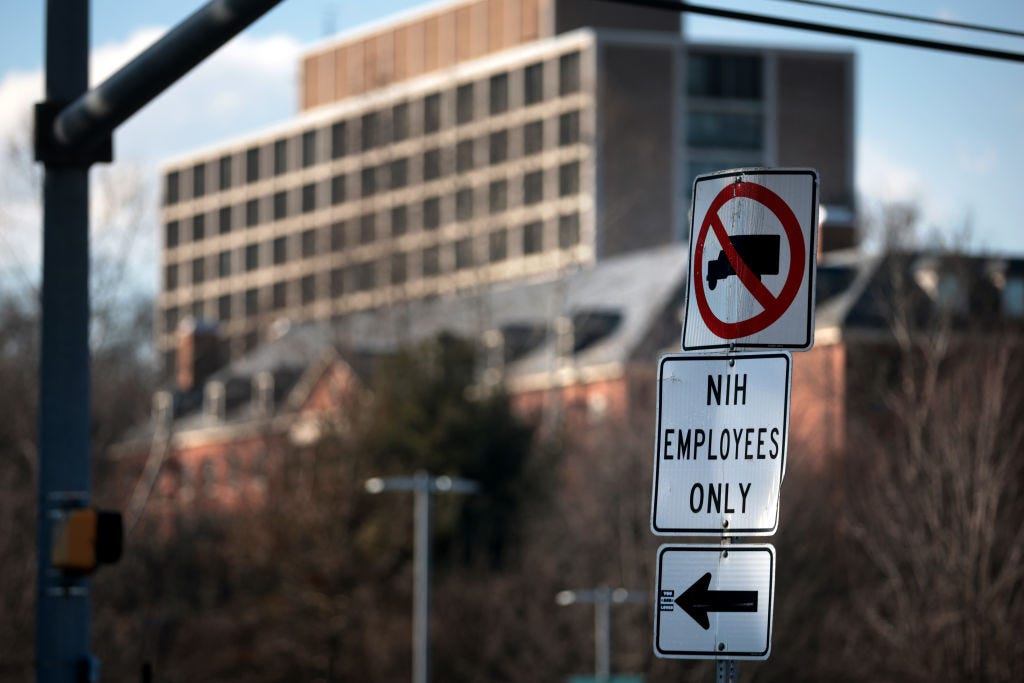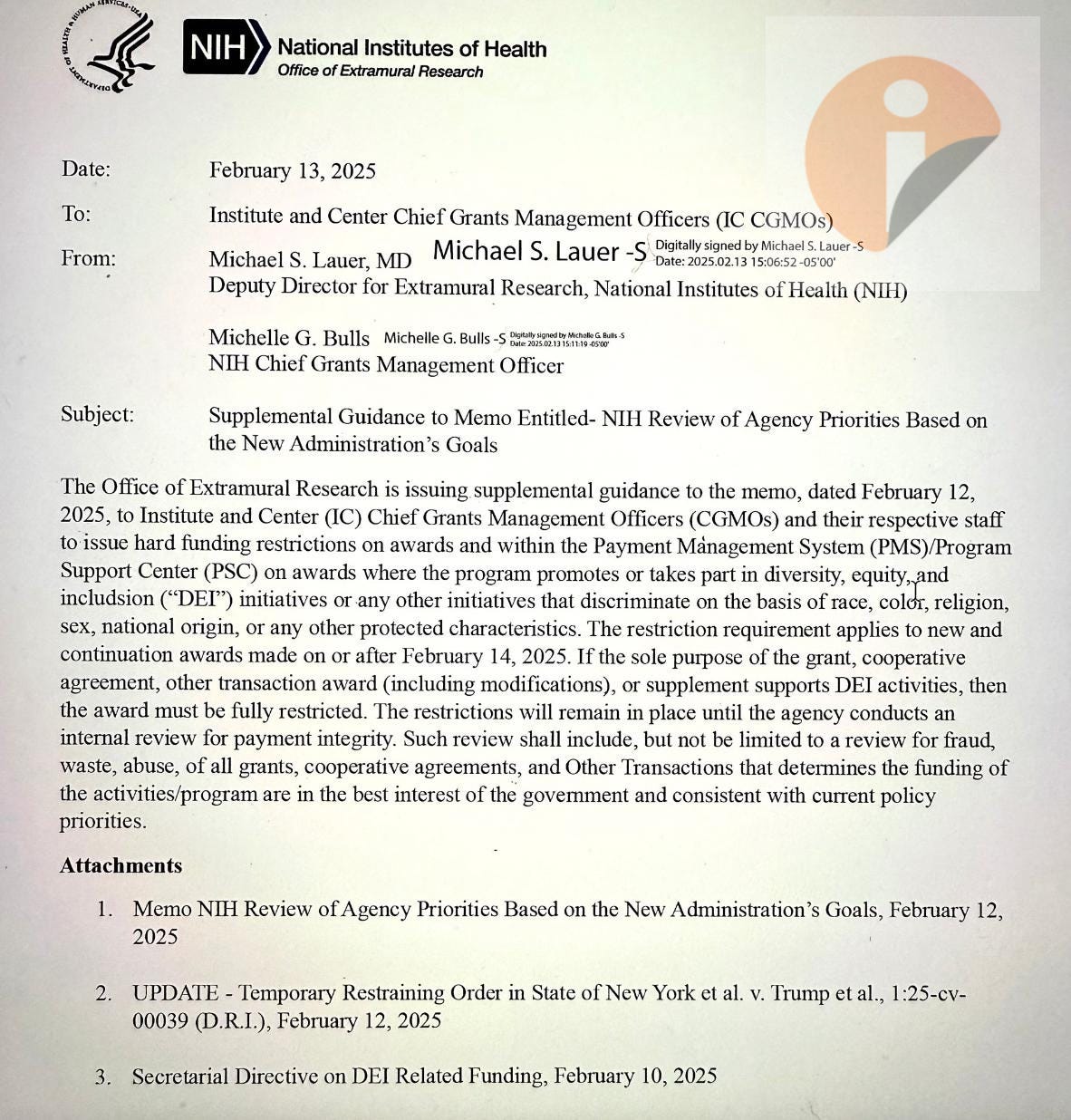UPDATE: NIH reimposes "DEI" funding freeze despite court order

The National Institutes of Health (NIH) is still blocking most ongoing scientific funding over concerns about "diversity, equity and inclusion" (DEI), according to NIH sources and internal NIH correspondence. The freeze has continued even after top NIH officials acknowledged that continuing to block the funding would violate a federal court order.
Last month, the Trump administration issued a memo, through the Office of Management and Budget (OMB), requiring federal agencies to "temporarily pause all activities related to obligation or disbursement of all Federal financial assistance," including "grants and loans." The purpose of the spending freeze was to ensure compliance with President Trump's executive orders prohibiting funding for "DEI," "woke gender ideology," and other topics.
The directive was quickly challenged in federal court by a coalition of 22 states. The federal court issued a temporary restraining order (TRO) on January 31, which "restrained and prohibited" the Trump administration "from reissuing, adopting, implementing, or otherwise giving effect to the OMB Directive under any other name or title."
A February 12 memo by two top NIH officials, which was not released publicly but was obtained by Popular Information, acknowledged that the TRO prohibited the agency from freezing funding to implement Trump's executive order on DEI. "We recognize that NIH programs fall under [the] recently issued Temporary Restraining Order[]," the officials wrote and, therefore, "grant management staff" can "proceed with issuing awards for all… grants."
That has not happened.
Another memo issued by the same officials on February 13, obtained by Popular Information through an NIH source, provided "supplemental guidance." The February 13 memo imposed "hard restrictions on awards… where the program promotes or takes part in [DEI] initiatives." The restrictions apply to "new and continuation awards made on or after February 14, 2025." The freeze will "remain in place until the agency conducts a review" to determine whether "funding of the activities/programs are… consistent with current policy priorities."
According to another NIH source, the agency conducted a keyword search to identify "DEI" grants. All funding for these grants has been frozen. Internally, NIH staff believes these grants may be canceled entirely, the source told Popular Information. Further, in some of the NIH's institutes and centers, according to internal NIH correspondence reviewed by Popular Information, all grants have been frozen pending the creation of an anti-DEI language that can be added to applications. Thus far, the language has not been provided to grant management staff.
The freeze has impacted the funding of most continuing grants at NIH. These grants fund ongoing research, including many studies involving human subjects in clinical trials. Since Congress provides funding annually, these grants must be extended each year, but it is normally a routine administrative process.
Freezing this funding to implement the administration's DEI policies does not comply with the federal court's TRO. It also jeopardizes critical research on cancer treatments, heart disease prevention, stroke intervention, and other potentially life-saving topics.
David Moorman, a brain researcher and professor at the University of Massachusetts Amherst, has not had his annual grant renewed. It is now three weeks late. "At some point, our money will run out and if it doesn’t get renewed, we will have to start firing people in my lab and this research will die," Moorman told the Boston Globe.
From February 1, 2025, to February 12, 2025, there was a total freeze on the issuing of continuing grants, according to publicly reported data. After the issuance of the February 12 memo, some continuing grants have been funded. Between February 13, 2025, and February 22, 2025, there were 335 continuing grants issued with a total value of $200,235,780. However, the data shows that most continuing grants are still being blocked. Over the same nine-day period in 2024, there were 823 grants issued with a total value of $484,709,831.
Funding for continuing grants administered by the National Cancer Institute has dropped from $162 million between February 1, 2024, and February 22, 2024, to $27 million over the same period this year.
We started a new publication, Musk Watch. NPR covered our launch HERE. It features accountability journalism focused on one of the most powerful humans in history. It is free to sign up, so we hope you’ll give it a try and let us know what you think.
How the administration is blocking all new NIH grants
For a new grant to be issued by the NIH, it must be approved by a committee of scientists, doctors, and other reviewers. Each year there are "about 2,600 meetings involving some 28,000" experts that review and approve grants.
Before a meeting can take place, however, there must be a notice published in the Federal Register at least 15 days in advance. The Trump administration has completely halted the issuance of new grants by blocking the NIH from posting new notices in the Federal Register. Already, the move "has stalled about 16,000 grant applications vying for around $1.5 billion" in funding, an NIH source told NPR.
No NIH-related meetings "have been posted to the Federal Register since January 21, the day after Trump’s inauguration." The only meetings that have occurred were those that were posted before Trump took office. The administration has not explained why it is blocking notices or when the policy might be lifted.
For example, Robert W. Sobol, a Brown University researcher, was informed that a "scheduled review of his application for a National Institutes of Health grant to research ways to treat brain cancer was abruptly postponed last week, with no word from NIH on why or when the meeting might be rescheduled." Carole LaBonne, a molecular biosciences professor at Northwestern University whose grants are also impacted by the meeting cancellations, said that if the meetings do not resume soon, "the effects are going to be catastrophic."
David Super, a professor at Georgetown University Law Center and an expert on administrative law, said the blockade of funding of new grants is illegal. “It is accomplishing what they’ve been ordered by the courts not to accomplish, which is a funding freeze,” Super said.
The purpose of the TRO, Super explained, is to stop the funding freeze. Finding new ways to impose the same policy, as the Trump administration appears to be doing, is not compliance.



As always great work. As always where are the other media outlets on this ? This needs to be front and center all the time in all possible forms. Also WTF is wrong with these people?
Blocking these grants and awards is an outrageous tragedy made more infuriating by the fact that these MAGA inquisitors have made their decisions based on a f'king keyword search. Really? They have all this IT talent supplied by Musk and the tech bros and the best they can do is CTRL+F in a pdf? Either they are not nearly as bright as they think they are and fail to consider context, or they don't care and blocking all grants and awards is the desired result. After all, the tax cuts for Musk, Bezos, Zuckerberg and Buffet aren't going to be paid for out of thin air.